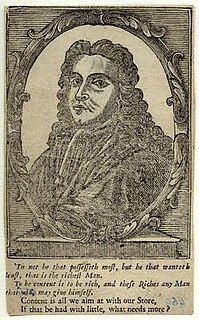Related Research Articles

Thomas Dudley was a colonial magistrate who served several terms as governor of the Massachusetts Bay Colony. Dudley was the chief founder of Newtowne, later Cambridge, Massachusetts, and built the town's first home. He provided land and funds to establish the Roxbury Latin School, and signed Harvard College's new charter during his 1650 term as governor. Dudley was a devout Puritan who was opposed to religious views not conforming with his. In this he was more rigid than other early Massachusetts leaders like John Winthrop, but less confrontational than John Endecott.

John Cotton was a clergyman in England and the American colonies and was considered the preeminent minister and theologian of the Massachusetts Bay Colony. He studied for five years at Trinity College, Cambridge, and another nine at Emmanuel College, Cambridge. He had already built a reputation as a scholar and outstanding preacher when he accepted the position of minister at St. Botolph's Church, Boston in Lincolnshire, in 1612. As a Puritan, he wanted to do away with the ceremony and vestments associated with the established Church of England and to preach in a simpler manner. He felt that the English church needed significant reforms, but he was adamant about not separating from it; his preference was to change it from within.

William Alabaster was an English poet, playwright, and religious writer.

Aspley Guise is a village and civil parish in the west of Central Bedfordshire, England. In addition to the village of Aspley Guise itself, the civil parish also includes part of the town of Woburn Sands, the rest of which is in the Borough of Milton Keynes in Buckinghamshire. Together with Woburn Sands and Aspley Heath, it forms part of the Milton Keynes urban area. It is centred 6 miles (9.7 km) east southeast of Central Milton Keynes and 1 mile (1.6 km) south of the M1 junction 13. It has its own railway station on the Marston Vale Line, and an historic centre with 29 listed buildings.

Nathaniel Ward was a Puritan clergyman and pamphleteer in England and Massachusetts. He wrote the first constitution in North America in 1641.

Samuel Stone was a Puritan minister and co-founder of Hartford, Connecticut.

John White was an English clergyman and the rector of a parish in Dorchester, Dorset. He was instrumental in obtaining charters for the New England Company, and the Massachusetts Bay Company. He took a personal interest in the settlement of New England.
Augustine Lindsell was an English classical scholar and Bishop of Hereford. In church matters he was advanced by Richard Neile, and was a firm supporter of William Laud. As a scholar he influenced Thomas Farnaby.
Thomas Sparke (1548–1616) was an English clergyman, who represented the Puritan point of view both at the 1584 Lambeth Conference and the 1604 Hampton Court Conference.

Thomas Turner was an English royalist churchman and Dean of Canterbury.

Henry Scudder was an English minister of presbyterian views, known as a devotional writer, and member of the Westminster Assembly.
John Towers was an English churchman, Bishop of Peterborough from 1639, a royalist and a supporter of the ecclesiastical policies of William Laud.
Matthew Cradock was a London merchant, politician, and the first governor of the Massachusetts Bay Company. Founded in 1628, it was an organization of Puritan businessmen that organized and established the Massachusetts Bay Colony. Although he never visited the colony, Cradock owned property and businesses there, and he acted on its behalf in London. His business and trading empire encompassed at least 18 ships, and extended from the West Indies and North America to Europe and the Near East. He was a dominant figure in the tobacco trade.

Thomas Allen or Allyn was an East Anglian nonconformist minister and divine who preached during the 1640s in Charlestown, Massachusetts, but returned to England during the Commonwealth and was ejected after the Restoration. He was the author of various published works.
Timothie Bright, M.D. (1551?–1615) was an Early Modern English physician and clergyman, the inventor of modern shorthand.
William Whitaker (1629–1672) was an English Puritan ejected minister.

William Richardson (1698–1775) was an English academic and antiquary, Master of Emmanuel College, Cambridge from 1736.

John Wilson was a Puritan clergyman in Boston in the Massachusetts Bay Colony, and the minister of the First Church of Boston from its beginnings in Charlestown in 1630 until his death in 1667. He is most noted for being a minister at odds with Anne Hutchinson during the Antinomian Controversy from 1636 to 1638, and for being an attending minister during the execution of Mary Dyer in 1660.
References
- ↑ Butler, Edward Harry (1951). The story of British shorthand. Pitman. p. 185.
- 1 2 3 4 5 6 Cooper 1885.
- ↑ Bremer, Francis J. (2003). John Winthrop: America's Forgotten Founding Father. Oxford University Press. ISBN 9780199839629.
- ↑ "The Record of Bucks". Bucks Herald. 17 September 1921. p. 2.
- 1 2 Carlton, William J (11 February 1877). "A SHORTHAND "INVENTOR" OF 300 YEARS AGO" (PDF). Records of Buckinghamshire. 11: 77–83. Retrieved 8 March 2020.